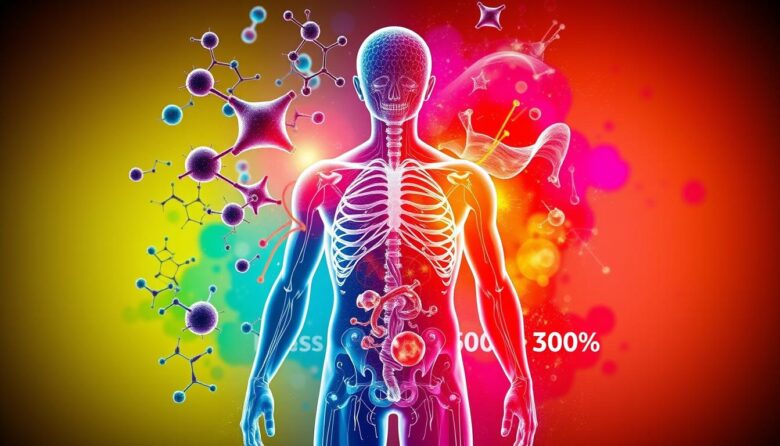As men get older, their testosterone levels drop. This can make them gain more body fat. At DietGuru.com, Dr. John Spencer Ellis helps men over 40 improve their health and hormone levels. Testosterone is key in controlling body fat, and low levels can cause obesity.
With over a third of men over 45 having low testosterone, it’s important to know how it affects body fat.
Start improving your health, hormones, and looks at DietGuru.com with Dr. John Spencer Ellis. We aim to help middle-aged men reach their health goals with science-backed, holistic methods. We think better sexual health boosts a man’s confidence and ties into overall health.
Key Takeaways
- Testosterone levels decline by 1-2% each year after age 40, leading to increased body fat.
- Low testosterone levels are associated with metabolic abnormalities, including obesity.
- Men over 40 can optimize their health and hormones with the right guidance and support.
- Testosterone plays a critical role in managing body fat and metabolism.
- Annual blood panels for testosterone levels are recommended for men, specially those showing symptoms of low testosterone.
- Strength training and a balanced diet can help increase metabolism and reduce body fat.
Understanding the Testosterone-Fat Connection
Testosterone and body fat have a close relationship. Hormone balance is key to our metabolism. Testosterone helps build muscle, which boosts our metabolism. After 40, testosterone drops, leading to more body fat.
Studies show testosterone levels and body fat are linked in men. Lower testosterone means more body fat. Testosterone therapy can help with weight loss and better body shape.
The Science Behind Hormone Balance
Hormone balance is vital for a healthy metabolism. Low testosterone can upset other hormones, causing health problems. Knowing how hormones work helps us see why testosterone is important.
Why Age 40 is a Critical Turning Point
Age 40 is a big change for men, as testosterone levels drop. This can cause weight gain, less muscle, and lower libido. Understanding these changes helps us stay healthy.
The Role of Testosterone in Metabolism
Testosterone is essential for our metabolism, helping build muscle. As we age, muscle loss slows our metabolism. Keeping testosterone levels up supports our metabolism and health.
Signs of Low Testosterone in Middle-Aged Men
As men get older, their testosterone levels drop. This change affects their health and happiness. It’s key for middle-aged men to spot the signs of low testosterone early.
About 30% of men who are overweight have low testosterone. But, only 6% of men with a normal weight have it.
The symptoms of low testosterone include:
- Low sex drive (libido)
- Problems with erections
- Low sperm count
- Sleep issues such as insomnia
- Decrease in muscle size and strength
- Bone loss
- Increase in body fat
- Depression
- Trouble concentrating
Studies show that testosterone replacement therapy might help with symptoms like muscle and bone strength. But, it’s important to think about the risks and side effects.
We can help middle-aged men find the signs of low testosterone and take steps to get better. Knowing the symptoms and risks helps men make smart health choices. They can seek medical help if needed.
The Impact of Body Fat on Hormone Production
As we get older, our bodies change a lot. This can affect how we make hormones. One big change is gaining body fat, which can really impact hormone levels, like testosterone. Studies show that being overweight is linked to lower testosterone, and this is true for men over 40.
Research shows that testosterone levels drop with age. Young men have about 598 +/- 188 ng/dl, while older men have about 453 +/- 161 ng/dl. Also, as we age, we lose muscle and gain fat. This means that body fat and testosterone levels are closely linked. For example, a study with 57 men aged 70-80 found that testosterone levels go down with more body fat and insulin levels.
To stop weight gain and its effects on hormones, it’s key to stay at a healthy weight. Eating 1,800 calories a day, with the right mix of protein, carbs, and fats, helps with testosterone. Also, keeping muscle through exercise is important for hormone levels when losing weight.

For more info on body fat and hormone production, check out testosterone therapy and depression. This can help men over 40 understand how to keep their health and well-being in check.
- Maintain a healthy weight through a balanced diet and regular exercise
- Prioritize preserving lean muscle mass through weight training
- Monitor testosterone levels and adjust lifestyle habits according
Natural Ways to Boost Testosterone Production
Men over 40 can naturally boost their testosterone. Exercise, like strength training, is key. It helps make proteins and increases testosterone. Eating right, with healthy fats, proteins, and carbs, also helps balance hormones.
Chronic inflammation can lower testosterone. Eating anti-inflammatory foods and reducing stress helps. Omega-3 foods and stress-reducing activities like meditation are good for this.
Other ways to boost testosterone include:
- Getting enough sleep, as lack of sleep can reduce testosterone levels by up to 15%
- Reducing stress, as chronic stress can lead to prolonged exposure to cortisol, which reduces testosterone levels
- Limiting alcohol consumption, as excessive alcohol consumption can decrease testosterone levels
- Getting enough vitamin D, as a deficiency in vitamin D can lead to low testosterone levels
By adding these natural steps to our lives, men over 40 can help their testosterone. Everyone is different, so what works for one might not for another. But making these changes can help support our hormone balance and health.
| Factor | Effect on Testosterone Levels |
|---|---|
| Strength training | Increases testosterone levels |
| Healthy diet | Supports hormone balance and testosterone production |
| Getting enough sleep | Reduces risk of low testosterone levels |
| Reducing stress | Decreases cortisol levels, which can reduce testosterone levels |
Testosterone and Body Fat Reduction: The Complete Strategy
As men get older, their testosterone levels often drop. This can lead to more belly fat. To tackle this, we need a complete strategy that covers exercise, diet, and lifestyle changes. A good plan can help men over 40 lose body fat and boost their testosterone levels.
Exercise is key to keeping testosterone healthy. We suggest at least 30 minutes of cardio four times a week. Also, do strength/resistance training two times a week to keep muscles strong. Eating a balanced diet with about 1,800 calories a day is also important.
Exercise Protocols for Hormone Optimization
- Cardio exercise: 30 minutes, four days a week
- Strength/resistance training: two days a week
- High-intensity interval training (HIIT): for improved metabolism
By sticking to a complete strategy that includes exercise, diet, and lifestyle changes, men over 40 can see big improvements. They can lose body fat and boost their testosterone levels. This leads to better health and well-being overall.
Common Myths About Testosterone and Weight Loss
We often hear common myths about testosterone and weight loss. These myths can confuse us and make it hard to understand how these two are connected. As we get older, our testosterone levels go down. This can make us gain weight.
One big common myth is that testosterone replacement therapy alone can help us lose weight. But it’s not that simple. Testosterone can help build muscle and boost our metabolism. Yet, we also need to make healthy lifestyle choices like getting enough sleep, eating right, and exercising.
When we talk about testosterone and weight loss, there are a few important things to remember:
- Insulin resistance can happen as testosterone levels drop, leading to fat gain
- As we age, we lose muscle mass, which can cause fat cells to grow, mainly in the belly
- Our waist size and body measurements are key to seeing changes in body composition
Understanding the link between testosterone and weight loss helps us make better health choices. It’s important to know what’s true and what’s not. Always talk to a healthcare expert to create a plan that’s right for you.
The Role of Sleep in Testosterone Production
Sleep is key for men over 40 to boost their testosterone. It helps regulate hormones, including testosterone. Without enough sleep, hormone balance can be off.
Optimal Sleep Patterns for Hormone Balance
For hormone balance, men need good sleep habits. Go to bed and wake up at the same time. Make your bedroom quiet and dark. Avoid caffeine and screens before bed.
A study showed sleeping less than five hours drops testosterone by 10-15% in young men.
Creating the Perfect Sleep Environment
A great sleep environment is essential for better sleep and testosterone. Your bedroom should be dark, quiet, and cool. A healthy diet and exercise also improve sleep.
By focusing on sleep and a good sleep space, men over 40 can boost testosterone and health.
- Establish a consistent sleep schedule
- Create a relaxing sleep environment
- Avoid caffeine and electronics before bedtime
By making sleep a priority, men over 40 can improve hormone balance and health. This is important for improved sexual health and confidence.
Supplements and Medical Interventions
Men over 40 should know about testosterone support options. As we age, our testosterone levels drop. This can cause low energy, less sex drive, and weight gain. While diet and exercise help, some men might need supplements or medical help.
There are natural supplements like vitamin D, magnesium, and zinc that support testosterone. Taking these with a healthy diet and exercise can boost testosterone. For some, medical treatments like testosterone replacement therapy (TRT) are needed. TRT uses injections or gels to replace missing testosterone.
Natural Supplements for Testosterone Support
- Vitamin D: essential for testosterone production and overall health
- Magnesium: helps regulate testosterone levels and supports overall health
- Zinc: plays a critical role in testosterone production and immune function
Remember, supplements and medical treatments should be used with a doctor’s advice. It’s best to talk to a doctor or nutritionist to find the right treatment for you.
Monitoring Progress and Adjusting Your Approach
Working to boost our testosterone and cut down body fat means we must keep an eye on our progress. We track our testosterone, body fat, and health markers to stay on track. By monitoring progress, we spot areas to improve and tweak our plan. This might mean changing our diet, workout, or supplements.
Keeping an eye on our testosterone levels is key. As we get older, our testosterone drops, causing health problems like weight gain and low libido. By watching our levels and adjusting, we can fight these issues and stay healthy.
Important things to watch when tracking progress and tweaking our plan include:
- Regular blood tests to check testosterone and health markers
- Body fat percentage and measurements to see body changes
- Our overall health, like energy, mood, and libido

By being proactive and informed, we can boost our testosterone, lower body fat, and keep well. Always talk to a doctor before big changes in diet, exercise, or supplements.
Conclusion: Taking Control of Your Hormonal Health
Keeping your testosterone levels healthy is key for men over 40. It helps manage body fat and overall health. By understanding how testosterone and fat are connected, you can improve your hormonal health. This unlocks a new level of energy and vitality.
Studies show that making lifestyle changes, doing specific exercises, and getting medical advice can help. This can increase your testosterone levels and lower body fat. This approach not only makes you look better but also boosts your energy, mood, and sex life.
You have the power to balance your hormones and reach your wellness goals. Use the knowledge from this article to start your journey. Your future is bright, and by controlling your hormonal health, you can live a healthier, more vibrant life as a man over 40.










